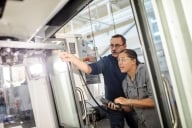You have /5 articles left.
Sign up for a free account or log in.
An American Political Science Association panel last week called for greater diversity within the discipline and its faculty. Wheelock College, in Boston, Mass., is taking a page from APSA’s report and has already begun crafting a political science curriculum for a new political science major, putting “the voices, experiences, and struggles of marginalized groups at the center of scholarly inquiry."
Wheelock is known for its education and social work programs, and has been called "without peer in diversity."
Gail Dines, the American studies department chair at Wheelock, said the college seems to be ahead of the curve in respect to APSA’s report, as the problems they mention are the ones the college has set out to address. “For us, the major will take the issues they say are ignored — race, inequality, gender, marginalization — and make them front and center,” said Dines, who will serve as the chair of the college’s political science and global studies major.
Dines said Wheelock has been tossing around the idea of a political science-focused major for about two years, but six months ago the college convened a curriculum team to craft the program. The APSA report, released last Friday, says political science is “often ill-equipped to address in a sustained way why many of the most marginal members of political communities around the world are often unable to have their needs effectively addressed by governments.”
Luis Fraga, a leader of the special task force that completed the report and a professor of political science at the University of Washington, said it is a "fascinating coincidence" that Wheelock's curriculum has many of the report's recommendations and suggestions already embedded within it. As stated in the report, interdisciplinary approaches to political science exist but are not common or mainstream in higher education.
"There are a number of programs around the country that have elements of these sorts of approaches that are very much tied to the expertise of individual faculty members," Fraga said. "But I'm not familiar with any other department that is as systematic as Wheelock in what it seems to be attempting."
Fraga said the report argued for additional approaches to political science in an attempt to appeal to a broader cross-section of students. "What Wheelock is doing is very exciting and it's nice to see their approach is so consistent with what we say should be considered and makes me feel our report is on track with the way other people are thinking in political science," he said.
Terri Givens, a co-leader of the special task force and professor of government at the University of Texas at Austin, said it seems as if Wheelock anticipated exactly what was written in the report. “This has nothing to do with going after the white guys; it’s all about that we just need to acknowledge as a discipline that there is this growing population that needs our attention because it’s a part of the political process,” said Givens, who is also a columnist for Inside Higher Ed.
Givens said it is great that Wheelock is combining political science with global studies, and she is curious to see how the program develops over time. This type of program is something that smaller colleges could do more easily, she said. But at larger institutions like hers, strides are still being made. For example, an African and African Diaspora studies department was recently created at the University of Texas at Austin with the help of some political science professors like herself, she said.
Dines said political science has been very focused on traditional notions of what constitutes politics. “But politics is much bigger than voting,” she said. “We study white men as a group to be studied, rather than a group to be taken as those who hold all the truth,” she said.
The new curriculum at Wheelock will offer the political science staples, like political structure and history, but also focus heavily on global minority issues and human rights. Dines said she is particularly excited about the curriculum’s focus on sex trafficking as a human rights violation. She said she hopes the college will become a center for critical thought on the complexities of the issue through this new major. “This is a real attempt to get our students engaged politically,” she said.
Other classes planned include Women and Globalization, Food and the Global Economy, Human Rights as World History and Sociology of Minority Groups. Students will also be expected to complete an internship with a human rights organization.
Dines said when she was researching how to put the curriculum together she looked to other institutions’ offerings. But she couldn’t find many programs that followed an intersectional approach to political science. “We want to bring those people who have been marginalized historically and bring their stories to the center of the curriculum,” she said. “We don’t believe in the 'add on and stir' approach.”
So a group of faculty members from a number of disciplines — anthropology, sociology, social work, etc. — were tasked with building a political science major from the ground up. “We hope that other places will not have to reinvent the wheel; we will have done that for them,” she said.








